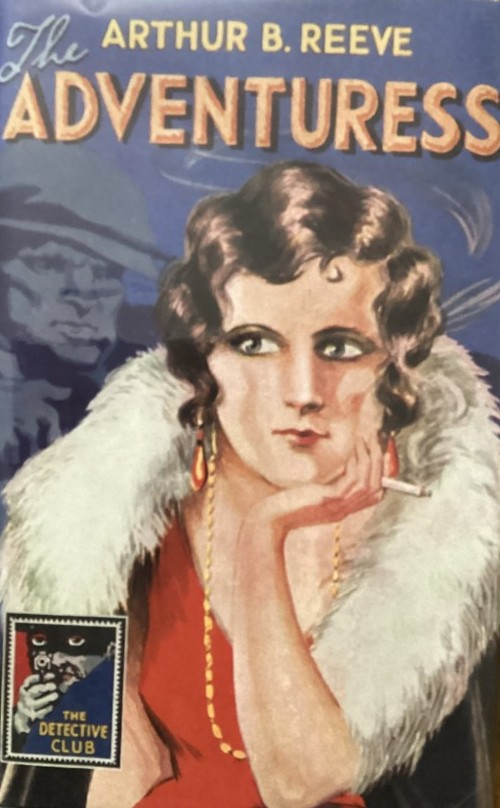Inspiring Older Readers
 posted on 27 Mar 2024
posted on 27 Mar 2024
The Adventuress by Arthur B. Reeve
Back in 1917 when this book was first published, U.S. author, Arthur B. Reeve was astonishingly popular. This popularity led to his private detective, Craig Kennedy, attracting the label of ‘the American Sherlock Holmes’. But before you get too excited by this kind of comparison, the experience of reading The Adventuress suggests to me that this is more a triumph of the publishers marketing hype than the quality of Reeve’s writing.
Reeve was also a criminologist and his most notable contribution to the Golden Age crime novel was to introduce a detective who relied more than most on science to help him solve the mystery. He prided himself on introducing cutting edge technology in his plots and The Adventuress is a perfect example of this. David Brawn who provided the 2016 introduction to this Collins Crime Club edition, notes:
“Reeve had undoubtedly struck a chord with readers and had modernised crime fiction to make it relevant and exciting; but, sadly, nothing dates quite as quickly as yesterday’s cutting-edge science.”
Marshall Maddox, head of Maddox Munitions Inc. has been murdered and the plans (along with a working prototype) for his new invention – a mysterious new device known as the ‘telautomaton’ that will revolutionise warfare – have been stolen. This is the start of a remarkably complex plot that sees the Maddox family and their close associates all come under suspicion.
Oddly enough given that Maddox has been murdered, the police are nowhere to be seen. Instead, the family turn to the academic and private detective, Craig Kennedy whose exploits are narrated by his Dr. Watson-like side-kick, Walter Jameson. They are, rather mysteriously I think, assisted by a small group of private detective agents who do a lot of the footslogging work.
As the story progresses the focus falls more and more on the dead man’s brother, Shelby Maddox who stands to inherit the company. This being 1917, there’s plenty of casual racism and sexism as Shelby is served by the inscrutable Japanese servant, Mito, who glides around with an air of mystery and who is, of course, versed in the martial arts. Shelby is also the seeming object of desire for the heady, exotic and delectable socialite and ‘adventuress’ of the title, Paquita – who in turn is being closely watched by another sinister foreigner, Sanchez.
In order to untangle the mystery and for Shelby to prove that he’s actually a good egg, Kennedy will need to unveil his mastery of the new science of telephony, electronic surveillance and a few other scientific wonders. The final revelation is held until the very last page but the disclosure hardly comes as a rattling great surprise.
Much of Reeve’s work was done via the short story format and I can see that Kennedy might come across better in that context – here Reeve’s grasp of the full length novel becomes baggy and clichéd and, for me at least, the end couldn’t come quickly enough once I was in the final third.
David Brawn’s introduction captures for me the essential weakness of the book:
“Craig Kennedy now reads more like a parody than a visionary detective.”
If you are interested in the development of 20th century detective fiction I think you may want to read this one – perhaps more out of curiosity than because it’s a thriller. To be fair, it flags up some of the changes in the genre that will come to more competent fruition as new writers emerge and more successfully integrate scientific progress in their books.
This Collins Crime Club edition was published in 2017, exactly a century after the original publication date. Copies can be found for well under £10 on second hand book websites.
Terry Potter
March 2024